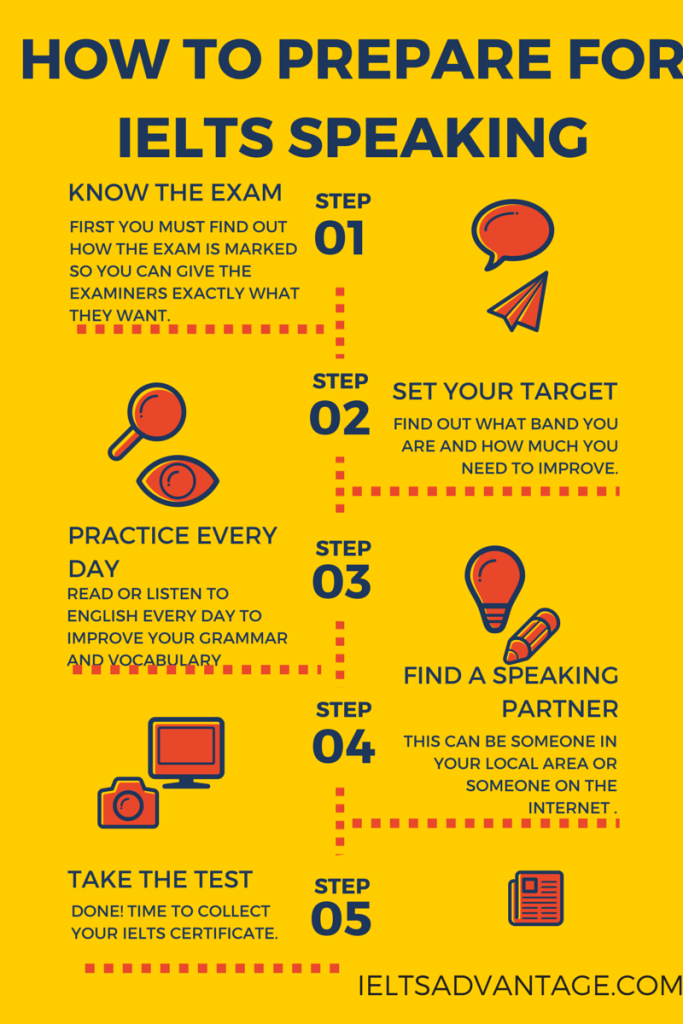This article will show you how to prepare for the IELTS speaking test.
Understand the Speaking Test Format
This might seem like an obvious point, but there are lots of students who go into the IELTS speaking test not knowing what to expect at all.
The speaking test is split into three parts and it lasts between 11-14 minutes in total.
Part 1 last around 4-5 minutes and you will be asked about yourself and your family. The examiner could also ask you about your hometown, your work or studies, your family or your hobbies. This part is designed to help you relax and start talking naturally about familiar topics.
In part 2 you will be given a card with a topic on it. The card will also have a list of points that you should talk about. You are given one minute to read the card, make notes and think about what you are going to say. You will then have to talk for between 1-2 minutes about that topic. The examiner will not ask you any questions or help you in any way when you are talking. Please check out our strategy for answering part 2 questions, if you need extra help with this.
Part 3 is the most abstract part of the speaking test and students often find it the most challenging. The examiner will ask you questions related to the topic you spoke about in part 2 and this part lasts for between 4-5 minutes. The examiner might test your ability to talk about the past, present or future, give your opinion, talk about hypothetical situations, compare and contrast or evaluate another person’s opinion.
Know What the Examiner Wants
It is essential that you understand how the exam is marked.
There are four marking criteria:
- fluency and coherence
- lexical resource
- grammatical range and accuracy
- pronunciation
Each criterion counts towards 25% of your mark and you will be marked on a 9 band scale.
Fluency refers to your ability to talk smoothly without any unnatural stoppages.
Coherence refers to how easy it is for the examiner to understand what you mean.
Lexical resource refers to your ability to use a wide range of vocabulary both appropriately and accurately.
You will also be given a mark for your grammar. Your sentences should be as error-free as possible and you should use a range of appropriate grammatical structures.
Finally, you will be judged on pronunciation. Your speech should be clear and contain a full range of pronunciation features, such as intonation, sentence stress and weak sounds.
Establish Your Current Band
You should find out what your current speaking band and then you will know how much you need to improve.
The best way to do this is to find an experienced IELTS teacher and ask them to tell you.
There are also some teachers online that can help you establish your score and help you prepare for the IELTS speaking test.
If you can’t find anyone to help you take a look at the IELTS speaking band descriptors and these should help you find your level.
Set Your Target and Make a Timeline
Now that you know your current IELTS speaking band you should set your target and make a timeline. It is very important to be realistic at this stage.
It normally takes between 200-300 hours of study to move up half an IELTS band. Therefore if you studied 20 hours a week it would take you between 3-5 months to improve your score by half a band.
It should be noted that everyone is different and the figures above are very general. Some people can improve more quickly and for others it takes a little longer. Also, the 200-300 hour rule is for someone trying to improve all four skills, so if you are just trying to improve your speaking, you might be able to do it in a shorter period of time.
Make a Study Plan
Now that you know how long it will take you to get the score you need, you should make a study plan and stick to it. Some people decide to join an IELTS school and just study when they are there, but if you really want to improve you should be also practising at home.
Check out our post on 25 free language learning tools for lots of great free websites that you can practice at home.
Below is an example of a study plan:
Monday
Morning- Listen to the news in English (30 minutes)
Evening– Practice speaking with friends online (30 minutes)
Tuesday
Morning- Read my favourite English blog (30 minutes)
Afternoon– Meet my friend for coffee and speak English (30 minutes)
Wednesday
Morning– Practice pronunciation at home (30 minutes)
Evening– Chat to my friend on Skype (30 minutes)
Thursday
Morning– Read the news in English (30 minutes)
Evening– Practice talking for 2 minutes about one topic (30 minutes)
Friday
Morning- Watch an English movie (30 minutes)
Evening– Record myself talking and listen (30 minutes)
You will obviously not follow exactly the same study plan, but it shows you that it is very easy to make improving your English part of your daily routine.
Learn From Your Mistakes

You should find out what your common mistakes or weaknesses are and then you can focus on improving them. Some people are very fluent speakers but make lots of grammar mistakes, some people are very good at grammar, but speak at an unnaturally slow speed and others are difficult to understand because they need help with their pronunciation.
Find a good IELTS teacher either in your local area or online and ask them to tell you your weak points.
If you have a friend who is a native or advanced English speaker, they can also help you with this.
Finally, you should record yourself and this will help you spot your weaknesses and help you fix them.
Prepare For the IELTS Speaking Test by Listening and Reading
In order to do well in the speaking test, you will need to improve your overall level of English. As stated above, you will be marked on your grammar and vocabulary, so improving these is essential. Listening and reading in English will really help you improve these skills.
For listening you should definitely check out Podcasts. Podcasts are like radio shows, but you can download them and listen to them whenever you like. There are millions of podcasts so it shouldn’t be difficult for you to find one you like. Try to find one on a topic that you are interested in, rather than one about learning English or IELTS.
For reading, you should find a blog that interests you. All you have to do is Google a topic you’re interested in and type ‘blog’ in the search. For example, you might be interested in travel so just search for ‘Travel Blog’.
Practice Speaking in Real Life Situations

The IELTS speaking test is supposed to represent what it is like to talk to someone in a real-life situation. You should therefore not practice IELTS past paper questions and just talk normally to someone instead. There are thousands of past paper questions and it is very unlikely that you will be asked any of them in your test.
Find someone to practice your English with and talk about something you are interested in. This will make it much easier and you are less likely to get bored.
One of my best students was so determined to improve her speaking that she got a part-time job in a 5-star hotel in her local town. She knew she would have to speak to mostly English speaking customers and this practice helped her get an 8 in the speaking test.
Practice Functional Language
I said above that you should not use past paper questions to practice, but you should be aware of the types of questions that normally come up in the IELTS speaking test.
You are likely to be asked about the past, present and future, your opinion, hypothetical situations, and what you think about another person’s opinion. You should, therefore, learn the grammar and functional language used to talk about these things. See my guide on 7 common IELTS questions for lots of help with this.
Extend Your Answers
One of the ways students get a low score is by giving very short answers. Practice not only stating your answer but also explaining what you mean and giving examples from your life. This will help you get in the habit and this will lead to higher marks on exam day.
For example, if you were asked the question ‘Who is the kindest person you know?’ you could answer one of two ways:
Answer 1– ‘The kindest person I know is my Mum.’
Answer 2– ‘The kindest person I know is my Mum because she gave us everything she could when we were growing up and made lots of sacrifices. For example, she would always buy us clothes and books instead of buying anything for herself.’
Answer 1 might be true, but it is so short that it doesn’t really allow the examiner to judge your ability.
By using the A-E-E formula (Answer-Explain-Example) you have shown the examiner that you can fully address the question and use a range of grammar and vocabulary. If you don’t do this, it will be more difficult to get a high score.
Next Steps
I hope you have found these tips useful. If you have any questions, let me know below.

